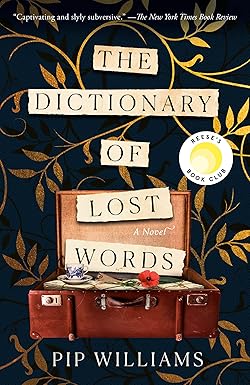Genres: Fiction, Historical
Buy on Amazon

"The Dictionary of Lost Words" by Pip Williams is a captivating novel that immerses readers into the world of words, specifically through the eyes of Esme, a young girl growing up amidst the creation of the Oxford English Dictionary (OED) in the late 19th and early 20th centuries.
Esme's journey begins in the Scriptorium, a shed where her father and a team of lexicographers meticulously collect words for the OED. Esme, initially hidden beneath the sorting table, discovers a discarded slip containing the word "bondmaid," sparking her fascination with words that reflect women's and common people's experiences—words overlooked or deliberately excluded from the dictionary compiled by men.
As Esme matures, she becomes determined to create her own dictionary, the Dictionary of Lost Words, dedicated to capturing these neglected words. Her quest takes her beyond the university and into the lives of everyday people, particularly women whose voices and stories have been marginalized. Against the backdrop of the suffrage movement and the looming Great War, Esme's journey becomes not just a linguistic exploration but a profound discovery of social injustices and the power of language to shape perceptions and reality.
Pip Williams skillfully weaves historical events and real figures associated with the OED into Esme's fictional narrative, creating a rich tapestry that blends fact and imagination seamlessly. The novel delves into themes of gender, class, and the evolving nature of language, offering a poignant commentary on whose stories are told and preserved in history.
Williams' prose is lyrical and evocative, painting vivid pictures of both the scholarly world of Oxford and the vibrant, often harsh realities of early 20th-century England. Esme's character is portrayed with depth and sensitivity, evolving from a curious child to a determined woman challenging the established norms of her time.
"The Dictionary of Lost Words" is not just a novel about words but a celebration of the diversity and resilience of language itself. It invites readers to ponder the ways in which language influences our understanding of the world and how reclaiming forgotten words can broaden our perspectives.
Overall, Pip Williams has crafted a thought-provoking and beautifully written novel that resonates long after the final page. "The Dictionary of Lost Words" is a testament to the enduring power of words and the importance of telling stories that have been overlooked or silenced—a must-read for lovers of history, language, and compelling storytelling alike.

